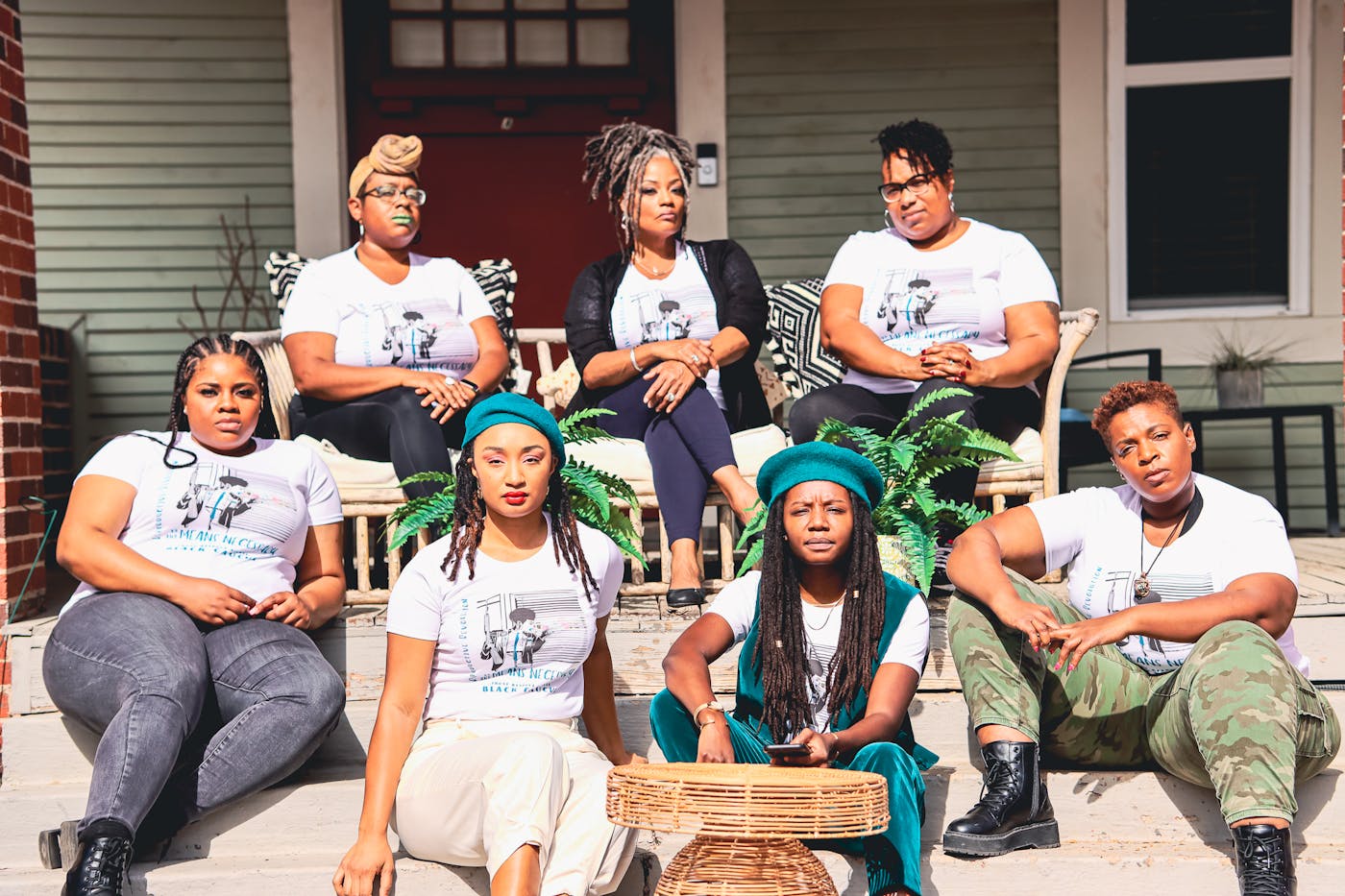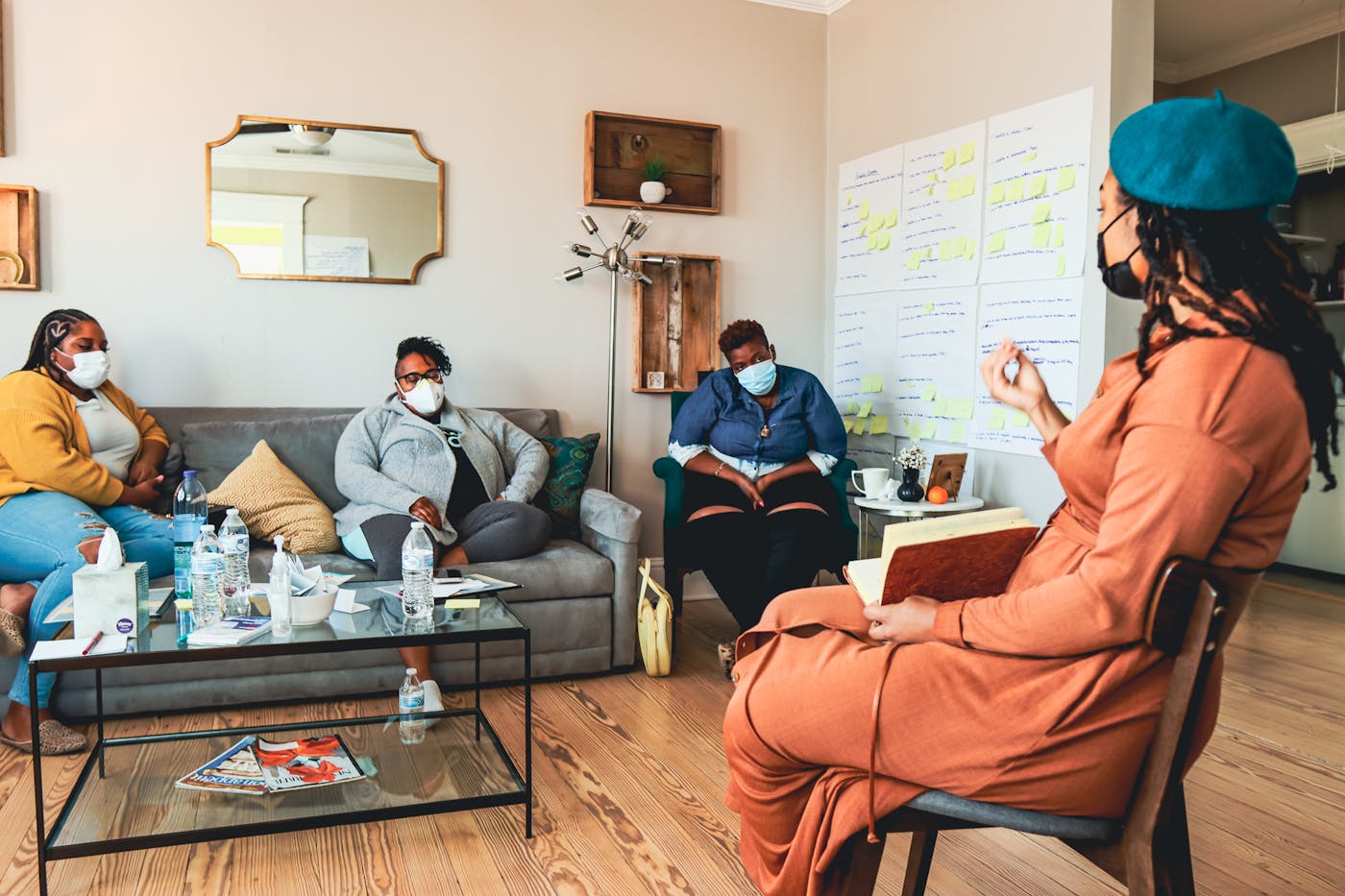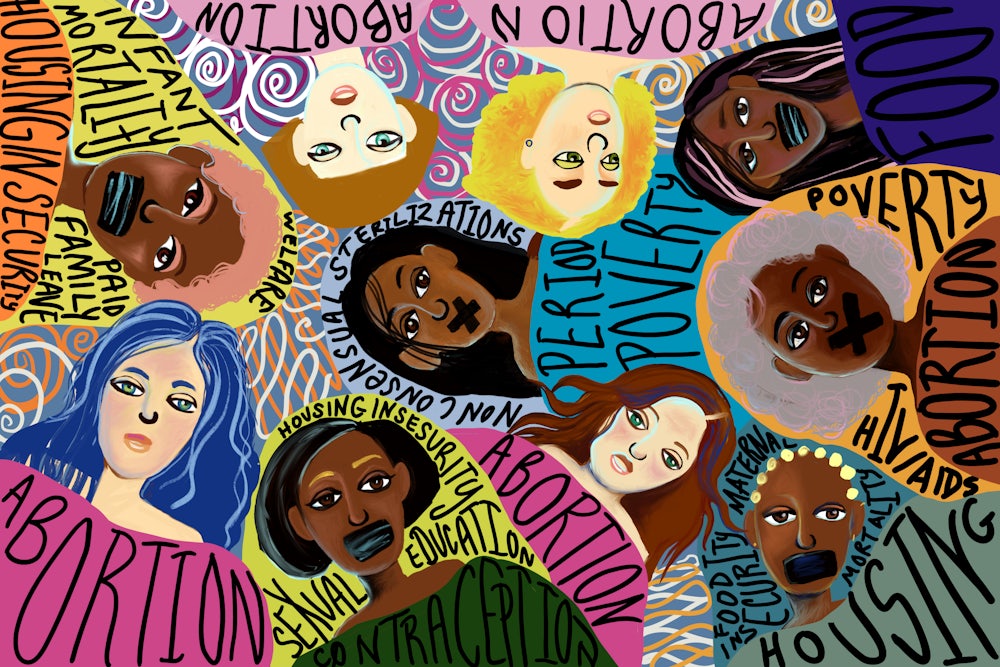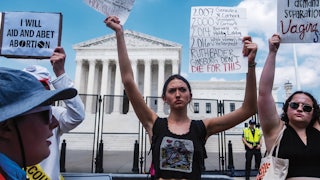In early February, a group of Black activists from a range of reproductive rights and justice organizations in Texas gathered at an Airbnb in Dallas. Since the country’s most restrictive abortion law to date, Senate Bill 8, had taken effect in September, some of the organizations had been fielding desperate messages from frantic Texans, many of whom were Black, and many of whom could not afford to travel out of state or take off work to get an abortion. Even as they bore witness to this crisis, Black organizers were feeling sidelined within the coalition of more than a dozen groups mobilizing against it. In response to a request from the Black Liberation organization 400+1, the Trust Respect Access Coalition—the main hub for political organizing around reproductive health care access in Texas, and an alliance that includes abortion funds, the ACLU of Texas, and Planned Parenthood Texas Votes—had quietly agreed to pause its work.
Over home-cooked meals, members of the coalition’s Black caucus gathered to chart a new path forward. Their meeting was organized by 400+1, whose website describes the group, which was founded by two Black women, as a “reproductive revolution federation.” 400+1 had produced a report based on observations of the coalition’s racial dynamics. The report concluded that Trust Respect Access was guilty of tokenism and implicit bias and that it lacked a coherent theory of change. The retreat was an intervention not only in the coalition’s racial dynamics but in its politics—which some felt were focused too heavily on responding to the state legislature rather than on building grassroots power. Caucus members wanted the group to embrace a more sweeping platform, one that would reach beyond the spiraling emergency of abortion to address the intersecting needs of low-income Black people struggling to survive. While the Supreme Court had not yet overturned Roe v. Wade, Texas activists saw their state as a harbinger for the rest of the country.
“This isn’t just about getting people to their abortion care,” said Trust Respect Access Coalition organizer Malkia Hutchinson-Arvizu in a video interview filmed at the February retreat. “It’s about getting people housed, it’s about getting people food, it’s about providing childcare.”

Within a few days, the activists had laid out a sweeping vision. Their first series of demands addressed internal dynamics. They called for a 1 percent fee on nonprofits led by non-Black leaders, a fee that would increase yearly by 1 percent until it reached a 10 percent cap; the money would go to a reparations fund. They also asked the Trust Respect Access Coalition to relinquish leadership to the Black caucus until January 1, 2024. The second set of requests overhauled the coalition’s mission with a 12-point agenda that committed not only to responding to the fallout from the six-week abortion ban but to eradicating maternal mortality, securing universal comprehensive sex education, and developing food security initiatives. One by one, the caucus members took turns recording video interviews on a beige velour couch, looking straight into the camera. They wore matching T-shirts emblazoned in 400+1’s signature teal color, with the text “By any means necessary” under an illustration of a person holding a long gun. Many of them described feeling disrespected by fellow organizers and answered questions posed by 400+1, like, “What has your work been like as a Black person specifically now that S.B. 8 [the six-week abortion ban] has passed in Texas?”
“I feel ashamed of myself for still being connected to this institution,” 400+1 co-founder Njera Keith said in her video, her voice breaking. “I have been disrespected, disregarded, ignored, talked about, so much. And I am constantly conflicted about how much am I sacrificing and compromising.”
Like many groups within the movement to preserve abortion access, the Texas coalition had been operating in crisis mode. For years, the Texas legislature had emitted a stream of bills taking aim at abortion, transgender children, immigrants, and voting rights. Niceties had fallen aside in the relentless, fast-paced churn of the legislative session, according to caucus member Kamyon Conner, executive director of the TEA Fund. Within this ferment, Black organizers were worn down by a sense that they were being told what to do by colleagues who often overlooked their expertise. Since the six-week ban passed last year, the stakes and stress levels felt particularly high. “When you don’t have enough resources, money, or time, and the stress is something you can’t even quantify, I think pleasantries and compassion are some of the first things to go,” Conner said. “We saw that playing out in this coalition.”
The crisis, of course, was ongoing. For more than 40 years, the right to legal abortion has been under siege. Although it came as a shock to many people when the Supreme Court overturned Roe v. Wade in June, the nationwide legal right to abortion had been threatened since the moment it was won in 1973. Politicians and court watchers had predicted the fall of Roe since at least 1989, when the Supreme Court upheld a Missouri law that restricted access to abortion but stopped short of striking down Roe. In 1992, Roe was imperiled again, this time by Planned Parenthood v. Casey. While some credited the case for “saving Roe,” the court’s decision in the case opened the floodgates for state-level restrictions that put abortion out of reach for many low-income people. Anti-abortion state lawmakers subsequently unleashed a relentless firehose of restrictions, demanding an endless series of defensive maneuvers from under-resourced abortion rights groups. This battle of attrition not only usurped the energy of the movement and desensitized abortion rights supporters to the feeling that abortion access was in crisis, it stalled progress on a whole host of feminist priorities, from universal childcare to comprehensive sex education.
“We’re talking so much about abortion; what is that taking away attention from?” asked Elena Rebeca Gutiérrez, co-author of Undivided Rights and a scholar of reproductive justice. Even as recently as a few years ago, nonconsensual sterilizations among women of color in immigrant detention were making headlines. Another neglected issue is so-called period poverty, Gutiérrez noted; as many as one in 10 college-age women regularly can’t afford menstrual products.
Veteran reproductive justice activist Loretta Ross said access to reproductive health care has understandably felt more urgent than demands like equal pay or education. “Bodily autonomy is the first fundamental human right,” Ross said. “Having your body held hostage to someone else’s needs is called slavery. So other things you might consider fighting for might recede in the distance.”
Yet centrist Democrats have not tended to view abortion or any other reproductive right with this level of urgency. The extent to which abortion has usurped the movement’s energy is attributable in large part to a Democratic Party that has failed to mount anywhere near as sophisticated or enthusiastic a strategy to improve abortion access as Republicans have used to diminish it. In the 1970s and 1980s, Republicans opportunistically seized on abortion as a central issue that would allow them to rise to power. Democrats’ lackluster defense of the right to end a pregnancy, encapsulated in tepid slogans like “safe, legal, and rare,” and the party’s long-standing failure to restore federal funding for the procedure (it was almost entirely withdrawn more than 40 years ago by the Hyde Amendment), forced grassroots activists to try to compensate for the vast failures of the state—hindering progress not only on abortion but on a whole host of feminist priorities. When reproductive justice activists have tried to pressure the state to address urgent issues like Black infant mortality and HIV/AIDS, they have often encountered such dire need that they’ve wound up attempting to provide what should be state-funded services themselves.
The Black and Latinx women who often led these grassroots efforts, and whose vision of reproductive freedom has often been more sweeping because of the intersecting oppressions they experience, have rarely had the leadership roles, funding, or institutional power that they deserve within the wider abortion rights movement. As a result, the movement’s leading institutions have often failed to operate in a way that serves the people hurt most by abortion restrictions. Instead, those organizations over the years tended to focus on defending the limited legal protections enshrined in Roe v. Wade. Now that Roe is gone, activists say this moment demands a reimagining of the path forward.
“I think it’s a wake-up call, in a way,” Malkia Hutchinson-Arvizu told me.
There was a moment in the early 1970s when universal childcare seemed more attainable than the right to legal abortion. As some states liberalized their laws to allow abortion under certain circumstances, Congress sent President Nixon a bill to fund a network of sliding-scale childcare centers. Nixon, who had already signed into law a bill to create the Title X family planning program offering federal funding for contraceptive services, had voiced support for the childcare bill. But then a nascent family values movement led by White House adviser Pat Buchanan seized on red-baiting rhetoric to convince Nixon that universal childcare would make the United States like the Soviet Union and constitute an “invasion of the family.” So Nixon vetoed the bill. Just over a year later, in a victory that stunned many feminists who had been fighting an incremental battle for legal abortion in the states, the Supreme Court legalized abortion nationwide with Roe v. Wade.
Feminists had fought hard for universal childcare. The National Organization of Women made it a central demand, staging a protest with stroller-pushing moms gathered outside the White House on Mother’s Day 1971. More radical feminist groups opened underground daycares of their own, like Liberation Nursery in New York City’s Lower East Side. In the 1960s and ’70s, feminists, especially women of color, built a stunningly comprehensive vision of what it would take to remake American society in a way that would lead to gender equity. The wages-for-housework movement demanded that child-rearing and household chores be seen as valuable social labor and compensated accordingly. Feminists organized to demand paid family leave, welfare rights, and protections for domestic workers. These efforts did win limited early victories, including, in 1978, pregnancy discrimination protections. Yet much of this history of organizing was erased by the blunt force of defeat, argued Kirsten Swinth, author of Feminism’s Forgotten Fight. “Feminists were defeated by the countering conservative forces who very effectively shot down this incredible, comprehensive vision.”
In the 1980s, President Ronald Reagan—who had, while he was governor, signed a bill to liberalize California’s abortion law—embraced the burgeoning religious right, forcing feminists into a “highly defensive posture,” Swinth said. The sense of abortion as feminism’s prevailing issue comes from this era, when the Reagan administration’s sweeping cuts to social services and championing of an anti-abortion constitutional amendment forced feminists to defend what they had gained in the 1970s—which, beyond the right to legal abortion, fell far short of what they wanted.
In defending Roe, feminists did not have anywhere near the institutional backing of their opponents. While Reagan embraced the rhetoric of the anti-abortion movement, Democrats only cursorily mentioned the issue of “reproductive freedom” in their party platform in 1984. This mismatch left feminists to champion an issue that Democrats tended to discuss tentatively against a political opposition that saw it as a ticket to victory—not only at the federal level but, crucially, at the local and state levels, where conservatives have built a stronghold of power.
Yet, even in this era of defensiveness, there was a recognition among many feminists, especially women of color, that abortion as a single issue would never be enough. Feminists helped craft and champion the Family and Medical Leave Act, which was first introduced in 1985 and vetoed twice by President George H.W. Bush before being signed into law by Clinton in 1993. Groups like the Reproductive Rights National Network, the National Black Women’s Health Project, and the National Latina Health Organization mobilized around a host of issues related to the health and well-being of people of color, from forced sterilization to the right of same-sex couples to adopt children—addressing needs that were both immediate and long-term. “That’s why I say we have to put people of color at the center, because that’s how they live their lives,” Gutiérrez said. “They know how to do that; they’ve been doing it for years.”
Critiques of the mainstream abortion rights movement—of the kind that the Trust Respect Access Coalition’s Black caucus released at the retreat in February—are far from new. In the early years of the fight to defend Roe, Black feminists understood the limits of the “choice” framework that Democrats and feminists tended to use. “During the early abortion rights campaign it was too frequently assumed that legal abortions provided a viable alternative to the myriad problems posed by poverty,” activist and scholar Angela Davis wrote in 1981. “The campaign often failed to provide a voice for women who wanted the right to legal abortions while deploring the social conditions that prohibited them from bearing more children.”
Black feminists like Davis “understood that capitalism and racism would accommodate Roe, producing a terrain where the liberatory elements of reproductive choice were hamstrung by the persistence of exploitative conditions,” writes Sara Matthiesen, the author of Reproduction Reconceived. In other words, the mainstream framework of “choice” could accommodate austerity policies in a way that the more holistic demands of Black feminists like Davis could not. After all, if childbearing was merely a personal choice, then why should society have to support it with welfare programs?
Under the cutbacks of the 1980s, the needs of low-income families became so profound that activists who wanted to expand the social safety net often found themselves filling in the gaps themselves. An example from Matthiesen’s book, the Maternity Care Coalition, formed in 1980 to address high rates of infant mortality in predominantly Black areas of Philadelphia. Organizers set out to mobilize poor communities where babies were dying and to create community maternity centers. But early on, the group’s board decided it could not organize suffering people without offering them services. So the group tried to balance its campaign of protesting against hospitals that were turning away Medicaid recipients with more mundane efforts to help mothers enroll in Special Supplemental Nutrition Program for Women, Infants, and Children, or WIC, benefits. Their work was “impressive and heroic” but unintentionally obscured the underlying systems responsible for the suffering, Matthiesen said. “Those projects did not start out to say, ‘Oh we really want to fill the need that public institutions are failing to meet.’ They started out trying to hold those public institutions accountable, but they felt that they could not continue doing that kind of advocacy without a mutual aid component and just were overwhelmed by the need.”
This pattern of reproductive health and justice activists filling in the cavernous gaps left by state neglect continues today across an array of social needs, including abortion. Organizations called abortion funds raise money to cover the cost of people’s abortions. This abortion funding work costs the movement millions each year; it is only necessary because federal and state governments have refused to cover comprehensive health care for everyone.
When Conner sat down to watch the mini documentary that 400+1 created out of videos filmed at the February retreat, the historical significance of what the organizers had done emerged to her for the first time. The film’s footage hearkened back to a pivotal moment in the struggle for abortion rights—the moment in 1994 when 12 Black women came together on the sidelines of a conference sponsored by the Illinois Pro-Choice Alliance and the Ms. Foundation. That gathering led to the creation of the term “reproductive justice” to describe a sweeping framework that encompasses the right to have an abortion, to become a parent, and to parent one’s children in safe communities. Conner saw the historical connection to 1994 and it “brought me to tears,” she said. “I was like, ‘Oh my God, this is what we’re doing.’”

But there’s a fundamental difference between the February platform and what happened in 1994, according to Loretta Ross, one of the 12 Black women who came up with the term “reproductive justice.” The Black caucus in February focused many of its immediate demands on holding its non-Black counterparts in the pro-choice movement accountable—something the original founders of reproductive justice didn’t do, Ross said. “We could have created a whole framework around what white women were doing wrong,” Ross told me in an interview. “We chose not to. We chose to center on what we were doing right.” It’s a common misinterpretation of the reproductive justice framework to say that it was a reaction to the failings of the white-led pro-choice movement, Ross said. “Yes, the pro-choice framework is inadequate but that’s not why we created reproductive justice.”
In fact, the framework was inspired by “the stupidity of the Clinton administration,” Ross said. The administration had come to the 1994 conference to present plans for health care reform that included sacrificing full reproductive coverage to try to win over Republican support. Gathered in a hotel room, Ross and the other founders of reproductive justice talked about how this made no sense, given that reproductive health care was the primary reason that many women went to the doctor. They ran a full-page ad in The Washington Post that issued sweeping demands for comprehensive health care reform. “We will not endorse a health care reform system that does not cover the full range of reproductive services for all women—including abortion,” it announced in all capital letters.
That demand remains unmet today, as do a host of priorities that second-wave feminism and the reproductive justice movement have mobilized around over the years, from universal childcare to paid family leave to comprehensive sex education. The local base of power that conservatives used in the 1960s and 1970s to fight against sex education has been weaponized in favor of efforts today to ban books and eliminate “critical race theory”—code for anything that touches on racial injustice. Despite the forced mass defection of women from the American workforce due to Covid-19, the universal childcare program that was within reach in the early 1970s now seems a distant dream. Federal legislation that would have protected Roe regardless of what the Supreme Court did died in the Senate. Nationwide legal abortion, one of the few unequivocal victories of the 1970s, is gone.
In this moment of defeat, the Black caucus represents a change in the way the struggle for abortion rights will be fought in the post-Roe era—and a reminder of the challenges and sacrifices involved in making that change. Even in the midst of the greatest abortion crisis in a generation, activists at the center of the fight demanded a pause to chart a new path forward. They felt it was worth pulling the brakes on crisis-oriented organizing in order to build a coalition that better represented the values its members espouse. But there was pushback. The “anonymous” foundation that provides major funding to the Trust Respect Access Coalition refused to go along with the demand that the Black caucus take over the coalition’s leadership and even moved to cut 400+1’s funding, according to 400+1’s Njera Keith. The “anonymous” donor is the Susan Thompson Buffett Foundation, backed by Berkshire Hathaway chairman Warren Buffett. (The foundation insists on the “anonymous” moniker even though its identity is an open secret within the reproductive health world.) This spring, after 400+1 could not get the rest of the Black caucus to unanimously agree to break away from the coalition to form their own entity, Keith said the group made the decision to leave on its own.
In mid-July, the Trust Respect Access Coalition met together with the Black caucus to discuss how the caucus envisions moving forward. Eight organizations—the ACLU of Texas, Afiya Center, TEA Fund, Lilith Fund, Jane’s Due Process, National Latina Institute for Reproductive Justice, Avow, and Texas Freedom Network—have so far signed on to revised demands that include payment of a one-time anti-Blackness fine and at least one seat for a Black caucus member on the coalition’s steering committee. A spokesperson for the reproductive rights organization Deeds Not Words, which is in the process of signing on to the demands, said it “looks forward to supporting the Black caucus and new direction of TRA.” At such a pivotal moment, she went on, “we must continue to create space for and uplift Black women—because when they lead, we all benefit.” And Amanda Beatriz Williams, the executive director of the Lilith Fund, said her group was proud to support the TRA Black Caucus. “We … acknowledge their demands as a necessary and important step towards transforming the coalition for the better,” Williams wrote in an email. “The leadership of the Black Caucus gives us hope for the future of our movement.”
That sense of hope was echoed in a video of Njera Keith filmed at the February retreat. Sitting in a cream-colored blazer and teal beret, Keith finished describing the hurt she’d experienced from non-Black activists, and said she was feeling “good as fuck” about being part of the coalition—because of what the Black caucus had done. The videos of Keith and her 400+1 co-founder Kristina Brown have been scrubbed from the Trust Respect Access Coalition Black caucus website, as has the mini documentary filmed by 400+1—although it’s unclear who took them down.
“We have subverted a power dynamic that has perpetuated, contributed to, and even caused some of the feelings that I just described,” Keith said in the since-deleted video. “It’s our time now.”


